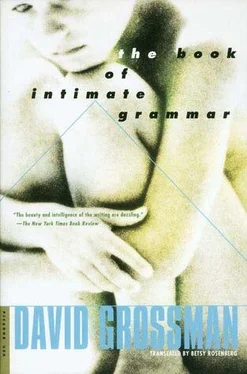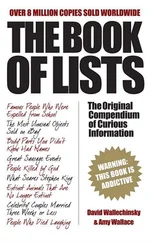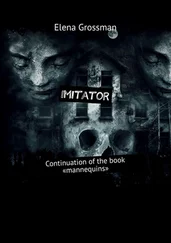David Grossman - The Book of Intimate Grammar
Здесь есть возможность читать онлайн «David Grossman - The Book of Intimate Grammar» весь текст электронной книги совершенно бесплатно (целиком полную версию без сокращений). В некоторых случаях можно слушать аудио, скачать через торрент в формате fb2 и присутствует краткое содержание. Год выпуска: 2002, ISBN: 2002, Издательство: Picador, Жанр: Современная проза, на английском языке. Описание произведения, (предисловие) а так же отзывы посетителей доступны на портале библиотеки ЛибКат.
- Название:The Book of Intimate Grammar
- Автор:
- Издательство:Picador
- Жанр:
- Год:2002
- ISBN:9781466803749
- Рейтинг книги:3 / 5. Голосов: 1
-
Избранное:Добавить в избранное
- Отзывы:
-
Ваша оценка:
- 60
- 1
- 2
- 3
- 4
- 5
The Book of Intimate Grammar: краткое содержание, описание и аннотация
Предлагаем к чтению аннотацию, описание, краткое содержание или предисловие (зависит от того, что написал сам автор книги «The Book of Intimate Grammar»). Если вы не нашли необходимую информацию о книге — напишите в комментариях, мы постараемся отыскать её.
The Book of Intimate Grammar — читать онлайн бесплатно полную книгу (весь текст) целиком
Ниже представлен текст книги, разбитый по страницам. Система сохранения места последней прочитанной страницы, позволяет с удобством читать онлайн бесплатно книгу «The Book of Intimate Grammar», без необходимости каждый раз заново искать на чём Вы остановились. Поставьте закладку, и сможете в любой момент перейти на страницу, на которой закончили чтение.
Интервал:
Закладка:
He dallied in front of the new supermarket. No one happened to be going in. The automatic door stood there innocently, pretending it was only glass. Daring him to enter. Come on, prove you’re a man, it said in Glass-dooric. He looked around. Not a soul was heading that way. To save him from the door. All right, he had no choice. He stepped up slowly, sure that all eyes were upon him. Now he’d have to stall for time: he bent down to tie his shoe. An old woman was approaching. Thank God. He waited for her, crouching, watching her out of the corner of his eye, and, at the right moment, stood up and joined her on the rubber mat. The door slid open, for both of them together, and Aron distinctly heard it hissing, ssssee … he hurried by the crowded shelves. In a blur he saw the fruit and vegetable counters, so much color and abundance, but he still had to get out of here. To exit through that door. And nobody else seemed ready to leave yet. He lingered by the newspapers, casually sneaking up on it. Menashe Anwar’s attorneyargues that his client was temporarily insane at the time of the murders. What kind of country is this anyway: a person can murder, rob, be a spy, and if they say they were crazy all is forgiven. Come on, pay attention, run! He made for the door just as a young man with an armload of shopping bags was about to go out. Aron shuffled over, hands in his pockets. Just an ordinary boy, on his way out of the supermarket. But the young man stopped. Uh-oh! He stopped! The cashier called him back to the checkout line, waving a slip of paper, and the man turned around, leaving Aron stranded at the door, the automatic glass door that senses people, senses their bodies. It can’t be fooled. It’s as cruel and uncompromising as an infirmary scale, emitting invisible rays through the skin to see whether your body is real or not. He cringed. Again he leaned down and tied his shoe. The whole shopping center was probably licking its lips by now. Oh God, please let someone come in. Even a dog. But no one did. Aron stood up. He set his foot on the rubber mat. He felt as if he was floating. As if he couldn’t quite land with his full weight. He hunched his shoulders, walked through.
Sure it opened, dum-dum. Did you really think it wouldn’t. What’s wrong with you, huh, tell me, what is wrong with you. Wearily, unresistingly, he looked up and met the gaze of Binyumin. Binyumin, who said nothing but ordered Aron over there. What does he want from me? Over there, and Aron complied obediently, reaching into his pocket: what could he throw the beggar that would sound like metal; he kept one of Papa’s old razor blades under the sole of his shoe, and the piece of saw he swiped from shop class hidden in his cuff; Mama kneeled with pins in her mouth, taking his trousers up, cheating for him, so no one would notice, and the small nails and the long black lead nail he carried around, the equipment he always had on him, in case there was an opportunity to do a Houdini act, which there hadn’t been for over a year, but where are we? What are we doing here? And Binyumin, yes, yes, we saw, he stuck his leg out indicating: There, over there, and Morduch the beggar shut his mouth, raised his bony head with the twisted veins, looking for something in the air, groping around, his mouth open wide to reveal his rotten teeth; of course! Finally Aron understood! What a dimwit he’d been not to catch on sooner, and he reached into his back pocket and pulled out the coin he’d won in the water, which had preserved its chill over such a long time, and withheavy resignation he dropped it into the rusty can in Morduch’s hand.
For a moment everyone in the square seemed to freeze. His heart pounded once, like an enormous gong announcing the entrance of a mysterious guest, faceless and nameless, whom everyone knew. Aron closed his eyes, reeling as he stood over him. When he opened his eyes again he saw that everything was back to normal. No one, apparently, had noticed anything. Anxiously he glanced around: people walking by with bags and briefcases. Shopping for the holiday, hurrying home. Cars drove past, honking for no reason. See, it’s all in your mind. You’re the one who’s abusing you. Put that pumpkin head to work and plan what you’re going to do tomorrow evening: where will you hide, how will you pass the time. See, everything’s normal. Except that Morduch the beggar was staring at Aron with his empty eyes, nodding his veiny skull, his hands fluttering this way and that, and Binyumin too was shifting his weight in the doorway of the barbershop, as though in prayer, as though they were tying an invisible knot together from opposite sides of the square. Aron fled. He ran for his life, past the drooping trees along the boulevard, home, home; he barely made it up the stairs, paused at the door, and gave his little cough, but when it opened they were in there glued together with all their might again, only this time he knew it was different, there was not the slightest trace of a nasty smile on their faces, and a fragment from a recent dream floated up, pieces that didn’t quite fit, two animals chasing each other gently in circles, creating a kind of moving wholeness, a full revolving circle, though luckily for him he was sound asleep at the time, peeking out of his dream at Yochi’s back; she was pretending to be sleeping, and she was frightened too, things like that had never happened around here before; luckily he wasn’t a light sleeper, he could curl up in his sleep with an imperceptible contraction, you can practice even in your sleep, you can stop the flow of fear through your body, you count their breaths and gather scientific data, all arranged and classified; one person chases the other around and around in a circle and suddenly they crash; no, at the last minute they don’t crash, a hand reaches out and catches them; at last they noticed him, standing in the kitchen, and slowly they separated, glaring at him, but why this anger, it choked him inside, and they blamed him yet, as if it were his fault, as if it were anybody’s fault, and she said he’d wasted his growing years, bullshit, baloney, and yet — who knows, she can dish out the sarcasm, oh yes, she’s a pro, but ifonly she’d tell him what to do about it. They were even ashamed to admit to the doctor that something like this had happened in their family. And they blamed Aron for it, as if he had betrayed them or brought some plague into the house that isn’t mentioned in the Bible, and ruined everything, the quiet life they led, even Yochi was distant these days. He could feel it, she and he were not as they used to be. He was becoming extremely sensitive to people who acted distant. People whose expressions changed. He knew of course what she was thinking inside: that if she ever did find a husband, they’d have to hide Aron so he wouldn’t think it was hereditary. There was no doubt that’s what she was thinking. Even if she still loved him a little and was ashamed of thinking that, that’s what she was thinking. Because that’s how they’d brought her up to think. But how could he fight his damn biology single-handed; he pleaded with the thing inside his brain, the particular gland responsible for growing: Okay, you’ve had your fun, you’ve had your laughs, three years you’ve been fooling around with me, we get the point, now do something, give me something, stop being so mean, just one little drop, from here to there, one teeny-weeny drop flowing no more than half a millimeter, and then everything will change, the world will change; for the past year and a half he had been praying to the gland, he had nothing to hide anymore and no strength to hide it, yes, for a year and a half now he had been secretly putting on tefillin under the covers, chanting from his bar mitzvah portion: Lo, this hath touched thy lips, and thine iniquity is taken away, and thy sin is expiated. Because maybe he had sinned, maybe he needed to atone. But what could he have done. He was pure, the purest member of the family. He couldn’t even shit in the toilet at home, for fear of pulling the chain too hard and causing a flood. And he never rubbed himself; who needed that when he could barely drag himself around. Still, maybe he was guilty of something. Like the time he gave Binyumin a beating and held him down and walked over him saying, “May you never grow.” Or maybe he had sinned in his imagination. At times he liked to imagine that he wasn’t really their son but the son of, say, a nobleman or a king. People from England or maybe Sweden, tall and slender, gracefully attired, speaking English quietly, wearing gold-rimmed glasses as they play the piano, because sometimes he suspected this would not have happened to him in a different family, as though it were something here, in their house, that cramped his soul, but no matter how he prayed, how hepleaded with the gland, it wouldn’t answer him; no matter how he banged his head against the floor trying to jolt it — No answer, no answer, mumbled Aron, trudging through the busy streets as noisy shouts and patriotic songs blared over the loudspeakers, and the smell of burning in the air after the fireworks, how the night sky suddenly burst into color, with a pang of longing he thought of Yaeli, and people kept bumping into him, saying, Hey, kid, watch where you’re going; he was out of step, out of sync, he always ruined everything, someone hit a sour note on the accordion: “Sing, oh water / Flow to the Negev.” “Flow,” that’s nice, and there are public showers there, but what about the flow of blood, and carefully he extricated the word “flow” from the general clamor, stripping it gently and whispering it backward thrice with great intensity; “Wolf wolf wolf,” his mouth clamped shut so none of the outer pollution would infiltrate, the tumult and the smoke and the crowds, till the dusty, sweaty sheath of “flow” dropped away like a cast-off skin, with its shrill notes and dissonances and random undertones; he hid it inside him, in the intimate new center, quickly checking over the other words he had smuggled in over the past few days: “supple,” “lonely,” “gazelle,” “profoundest secrets,” “sacrifice,” “tears,” words that welled out of an endless stream, and now “flow”; for seven days he would refrain from saying it aloud, till it was purified, till it was his, his alone. He struggled through the crowd, what a mob. Look at him, see the way he walks, he’s talking to himself. What’s the matter, kid, have you been drinking cognac? “Wolf wolf wolf,” it was hard to concentrate, hard to hear it over the noise. If only they’d shut up a minute, he would be able to organize his thoughts and wander through the streets again, free from worry, enjoying the music, having fun, if only he could get rid of that monotonous buzzing, that never-ending lament in his head, no answer, no answer, the gland was indifferent to him, it wouldn’t answer, and it was so hard to keep the rhythm as he walked through the crowd; maybe there’s a course in public walking like they have in public speaking, obviously you’ve never taken it, you stop, they move, they stop, you bump into them, and for almost an hour now they’re the ones who’ve been deciding where you go, they push and crush you like food passing through the alimentary canal, and now he found himself in front of a high platform, with a loud, incessant roaring in his ears as the crowd hemmed him in on every side. He turned and tried to flee, but the crowd was like a solid wall of fortified flesharound him. No chinks anywhere. Folk dancers in colorful costumes were doing the hora on the platform, while below the platform teenage kids were unabashedly doing the twist to the rhythm of the hora; “the social set,” he raised his weary head, having fun, living it up. Great bunch, he muttered aloud, to fool whomever it was necessary to fool, and meanwhile, with an expert eye he squinted at them tracking down the stowaway, the enemy he instantly identified as he went on counting Adam’s apples and sideburns and mustaches and breasts; it wasn’t easy either, they kept moving all the time, they really were enjoying themselves, playing with their new toys, idiots, they don’t belong to you! You’ve been had! But wait, maybe he was the one who didn’t understand, he, Aron, who wouldn’t allow himself a single moment of illusion or self-forgetting; maybe they go together, those things and the pleasure they bring. If only he could win the struggle with himself, get around himself, forget himself for five minutes, maybe that’s all he needed, five little minutes when his brain wasn’t watching, five free minutes. Okay, we heard you the first time, and you know what would happen then? You’d be just like they are. Huh? Whuh?
Читать дальшеИнтервал:
Закладка:
Похожие книги на «The Book of Intimate Grammar»
Представляем Вашему вниманию похожие книги на «The Book of Intimate Grammar» списком для выбора. Мы отобрали схожую по названию и смыслу литературу в надежде предоставить читателям больше вариантов отыскать новые, интересные, ещё непрочитанные произведения.
Обсуждение, отзывы о книге «The Book of Intimate Grammar» и просто собственные мнения читателей. Оставьте ваши комментарии, напишите, что Вы думаете о произведении, его смысле или главных героях. Укажите что конкретно понравилось, а что нет, и почему Вы так считаете.












